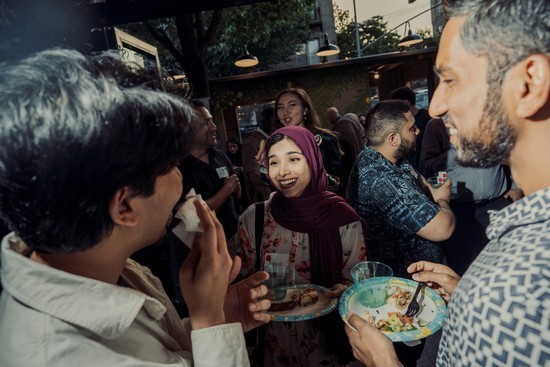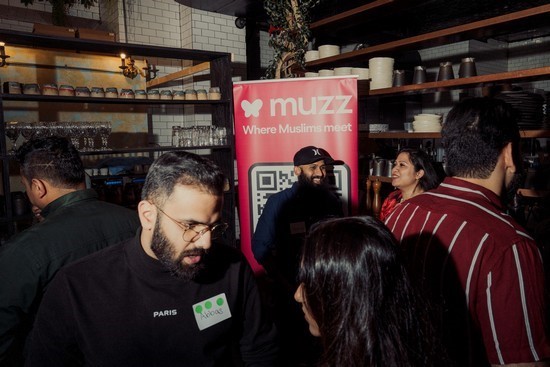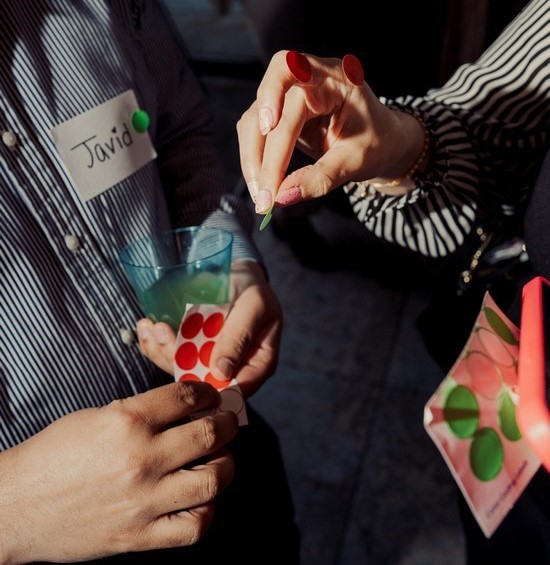On a Thursday evening in Bay Ridge, Brooklyn, about 250
Muslims gathered in a halal Italian restaurant for a singles dating event. Some
of them shied away from cameras, citing privacy concerns, while others said
they were afraid of appearing “desperate”.
اضافة اعلان
The event was hosted by Muzz, a Muslim dating app based in
London, with 8 million users worldwide, according to the company.
Prayer mats were set up in an outdoor dining tent for
Maghreb, the fourth of five daily prayers for Muslims. Inside the restaurant,
tables and chairs were cleared to make space for the mingling guests, and
platters of hummus, chicken kebab wraps, and Mediterranean salad were being
served.
Topics of conversation included halal Thai food in New York
(“Top Thai — we should go check it out,” one person said to another) and the
difficulty of meeting new people while working remotely.

According to Muzz, which was founded in 2011, 400,000
couples have married after meeting on the dating app, which offers free and
paid memberships. “The heart of the app is empowering young Muslims to find a
partner in their own right, but doing it in a way that respects their faith,
culture, traditions, and family,” Shahzad Younas, the founder of Muzz, said in
an interview. He aims to “embrace the quirks around Muslim marriage,” he said,
which includes a “sweet spot” of familial involvement. He noted that families
serve as a vital support network for couples.
On a North American tour in May, Muzz hosted dating events
in four cities: Toronto; Jersey City, New Jersey; New York; and Baltimore. Last
month, they hosted events in London and Dubai.

When the Brooklyn event started at 7pm, there was a clear
and nerves-filled divide at first: Women were talking with other women, and men
were mingling with men. It was a curious sight for a singles dating event.
At 7:30pm, Younas stood on top of a table in a corner and
made a welcome announcement. Women had received a sheet of eight green
stickers, and men had received a sheet of eight red stickers. To help make it
easier for people to introduce themselves to others, he said, the stickers must
be exchanged with people after a conversation — everyone’s goal is “to meet the
one,” he said, adding “inshallah,” or God willing.
The encouragement worked, and the two groups began mixing.

Some people came to only network and to meet other people of
a similar faith and cultural background. Ali Fall, a 34-year-old financial
consultant, said he had always dated non-Muslims, and his exes didn’t
understand his religious beliefs and obligations. Coming into the event, he had
no expectations. “I believe in destiny, everything is written,” said Fall, who
lives in Harlem.
Others were looking for “the one.” What matters to Mohammad
Binmahfouz, a 33-year-old global relations coordinator, is “respect and trust,”
he said. “And she prays … and fasts.” Binmahfouz drove 2 1/2 hours from
Meriden, Connecticut, to attend the event.
Others were making a statement about the way they find their
partners. Even though their parents had arranged weddings, many young Muslims
today want to make their own decisions about who they date, while still
respecting cultural and generational traditions.
For example, Salmah Ahmed, 25, and Mohibbah Abdul-Ahmed, 27,
sisters from Hillside, New Jersey, said their parents were pressuring them to
get married and tried to introduce them to potential suitors. “It’s annoying,”
Abdul-Ahmed said with a laugh.
“We want to look for the men we want,” she added.
Read more Technology
Jordan News



